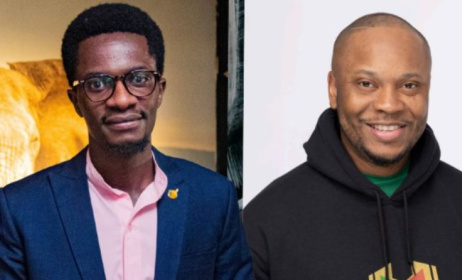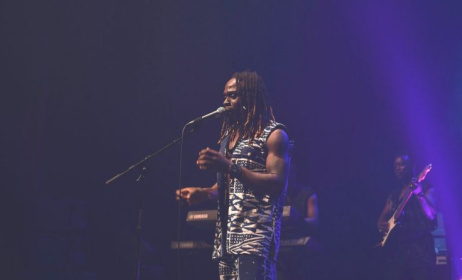Live music in Cameroon
By Monique Ngo Mayag
Live music is very popular in Cameroon. For this reason, sponsors, producers and the rest of the music industry use the live stage to promote bands and boost album sales. Festivals are regularly organized so that the public can see various African artists perform in front of their eyes.
 Patience Dabany at Palais de Sports in Yaoundé (Cameroon). photo by Monique Ngo Mayag
Patience Dabany at Palais de Sports in Yaoundé (Cameroon). photo by Monique Ngo Mayag
Live music first appeared in Cameroonian cities thanks to cabarets. Cultural journalist and music lover Delabois remembers the good old days of cabarets in economic and political metropolis Douala and Yaoundé between the 1970s and early 90s. His voice reveals a deep nostalgia of those endless makossa nights that rocked many generations in Cameroon. “Each quarter in Douala had a band” remembers Delabois. For example, Mermoz cabaret hosted Black Styl, a band of five talented musicians, among which were guitarist Toto Guillaume and singers François Nkotti and Emile Kangue.
Between 1980 and 1990, the people of Yaoundé used to rush to the Chacal bar to listen and dance to bikutsi and be entertained by famous band Les Têtes Brûlées (‘the hotheads’). Cabaret Le Caroussel has since taken over and has been the leading live spot for quite some time now. It hosts local artists of various styles. The live scene is now maintained through festivals.
Major festivals in Douala and Yaoundé
Since 2004, at the end of every year thousands of music lovers gather at the two-week Yaoundé Fair (Ya-Fe). In the heart of the capital, the organizing committee in partnership with the town council set up a stage on 20th of May Boulevard. The seasonal event has over the years hosted major African musicians such as saxophonist Manu Dibango, bass player Richard Bona or Ivorian artist Meiway. The 9th edition of Ya-Fe took place between 18 December 2014 and 1 January 2015. Leading instrumentalists’ talents are very much in demand at the event, whether they play jazz, bikutsi, makossa, Congolese ndombolo, soul music and more.[i]
Following in Yaoundé’s footsteps, the town council of Douala launched its very own festival, Ba-Doul, in 2009. In December 2009, Ba-Doul welcomed Petit Pays, the X Maleya band, Queen Eteme, Ekambi Brillant, Medhy Custos and more. All performances were accompanied by a high-quality orchestra and the event was sponsored by a mobile phone operator. Unfortunately, the event was cancelled in 2011 after only three editions. At the moment Ba-Doul is dormant.
Another dormant event is the female voice festival Massao, which was last held on March 2010. The two-yearly Massao is a 100% live event that introduced the audience to new female voices such as Kareyce Fotso, Corry Denguemo (ex-member of Macase band) and Gabonese Annie Flore Batchiellilys. In 2010, big names such as Gabonese Patience Dabany and Ivorian Dobet Gnahoré headlined the sixth edition. Massao was officially discontinued due to financial concerns experienced by promoter Theophile Mbouma Bissa.[ii]
Despite all the challenges involved, some continue to take some risks so that the show can go on. Other festivals include Le Kolatier, the 8th edition of which took place in October 2015 in Yaoundé after a challenging start in Douala. Festi-Bikutsi has been rocking Yaoundé since 1998 and hopes to promote traditional rhythms from inland regions, including bikutsi.[iii]
Promoters
The main promoters in Cameroon are Cy Entertainment, owned by Chinois Yangeu and running for about 10 years[iv]; and Universal production, owned by Sylvain Kom, who recently launched a show with virtuoso bassists Jay Lou Ava and André Manga. There is also JFT Talla Production, owned by Jephté Talla; and Real Time Music (RTM) Production, which included radio station RTM and TV channel LTM TV, owned by singer Dinaly, widow of famous singer Tom Yom’s. All these companies try to organize large live concerts on a sporadic basis.
During its 14th edition in 2012, Festi-Bikutsi hosted three major concerts for 53 artists on stage (and a further 23 off stage). “A festival’s main purpose is to promote arts and not to make money,” says communication manager Leontine Babeni. However, some local music fans and promoters complain about the high cost of the festival. Chinois Yangeu, the manager of Cy Entertainment and a major producer in Cameroon, points out the high financial cost of staging a concert: “You do need money to hire a whole orchestra. For example, if you want Ivorian singer Meiway to perform in Cameroon, you need to pay for the 15 musicians and dancers who come with him!” In order to please a demanding audience, many promoters count on sponsors when it comes to attracting crowds.
Venues
There are very few auditoriums in Cameroon, so most concerts are held outdoors, for example at football stadiums. Depending on the artist’s popularity, concerts in Douala can be held in the general-purpose stadium (35 000 seats), at the Bonanjo government square (nearly 30 000 people standing), at the Vita track (about 40 000 standing), at Castel Hall (1000 seats), at Saint John’s Plaza, in Bonaprisa quarter or in Douala Bercy (800 seats). In Yaounde the most popular places are the general-purpose stadium (40000 seats), the City Hall esplanade, the sports palace (5000 seats), one of the Hilton Hotel venues (600 seats) and 20th of May Boulevard that holds Cameroon’s Independence Day parade every year. Other venues are the French Institutes of Cameroon in Douala and Yaoundé, which host many live performances and can seat 700 each. In Yaoundé, the Goethe-Institut offers a stage for about 400 people.
Live tours
Local artists are as much in demand as international stars, depending on charts and trends. In 1998, Chinois Yangeu brought over many Ivorian artists when Coupé-Décalé was extremely popular all over the continent. He also organized live concerts in Douala and Yaoundé for French rapper La Fouine and his 10 musicians during the Kmer Fouiny Tour (21-23 December 2011), as well as Nigerian singer Flavour and his 10-man band (29-31 August 2013). For all these events, ‘live’ is the key word. “With live shows, the artist is truly in harmony with his audience,” explains Chinois Yangeu. “Performing on stage allows the artist and his instrumentalists to edit or to stretch the length of a song.”
At the end of the day, organizing a live show isn’t an easy thing at all. For this reason, many singers and musicians cheat by choosing to lip-synch or perform ‘semi-live’. But the audience can’t easily be fooled, judging by their reactions sometimes. On 20 December 2013, a concert organized by a mobile phone operator was largely deserted by the crowd. The show was six hours long (8pm to 2am) and all the artists, whether from Cameroon or abroad, lip-synched their songs, including X-Maleya, Stanley Enow, Chidinma, May-D, Museba and 2Face Idibia. Because of this failure, today many local artists fear or simply refuse to perform in lip-synch or semi-live mode.
Serge Maboma, leader of the band Macase, explains: “In 18 years, we’ve only performed lip-synching twice”. In 2003 at the Kora Awards in South Africa, the band insisted on performing live before the audience. The show was to be broadcast on various African channels. “The organizing committee finally let us sing on stage because they had already seen us in Congo,” says Maboma. Performing live now seems like a major risk that most Cameroon musician are willing to take
[i] http://www.ya-fe.com/ [ii] http://www.massao.org/ [iii] http://irondel.org/wp/wp-content/uploads/2013/05/LE-RAPPORT-DU-FESTI-BIKUTSI-2012.pdf [iv] https://www.facebook.com/pages/CY-ENTERTAINMENT/408555680430


































Comments
Log in or register to post comments